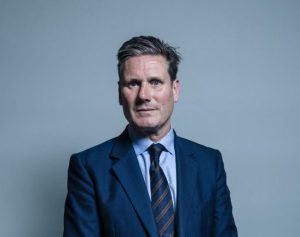Immigration policy part of Labour’s strategy in UK election
 Britain’s Labour Party leader Keir Starmer has pledged to scrap the Conservative government’s flagship scheme to send failed asylum seekers to Rwanda and he has vowed to reduce migration to Britain.
Britain’s Labour Party leader Keir Starmer has pledged to scrap the Conservative government’s flagship scheme to send failed asylum seekers to Rwanda and he has vowed to reduce migration to Britain.
As the UK’s general election approaches on July 4, immigration has become a major election issue, even though the Labour Party are heavy favourites to win in a landslide.
“I will bring immigration numbers down,” Mr Starmer said in a newspaper interview.
The former prosecutor has detailed Labour’s immigration plans as the Conservative government of Prime Minister Rishi Sunak has seen net regular migration levels soar to 685,000 last year –- more than three times the level in 2019, when the Conservatives won an election on a pledging to cut the figure.
Migration has become a contentious topic, with 18 percent of people saying it is the single most important election issue, according to a recent poll.
While Mr Starmer did not provide a timeline or exact figures for bringing down migration numbers, he said passing laws to curb it would be a top priority.
The plan would also punish employers who break labour laws, including by violating health and safety regulations or paying below minimum wage, by banning them from bringing workers from abroad.
Mr Starmer said Labour will also require employers to train UK nationals first, adding that bosses had become “too reliant” on foreign workers.
He has also adopted a tougher stance on borders and immigration than his predecessors, in line with his push for Labour to move to the political centre and return to government after 14 years.
In saying that Labour would scrap the Rwanda scheme, Mr Starmer said he would instead target the people-smuggling gangs who bring undocumented migrants across the English Channel in small boats.
So, who is Keir Starmer?
He is actually a ‘Sir’. He earned a knighthood as a reward for his five-year stint as director of public prosecutions, the country’s leading prosecuting lawyer.
Mr Starmer was the first member of his family to go to university and started out as a human rights lawyer, famously defending prisoners facing the death penalty in Caribbean countries and working pro- bono for two young anti-McDonalds campaigners in the 1990s.
Born in 1962, he grew up in a working-class household. His father was a toolmaker, his mother a nurse who later suffered serious ill-health.
A talented teenage musician, he chose to study law rather than music, attending Leeds and Oxford universities. He rose swiftly to become a Queen’s Counsel and head of his legal firm. He wrote legal opinions against the Iraq war and co-authored books on human rights law.
Mr Starmer became an MP in 2015. As an MP, he was immediately promoted to the front bench by then leader Jeremy Corbyn, first with an immigration brief and then – after the European Union referendum in 2016 – as shadow Brexit secretary.
In that role he had the near-impossible task of managing a divided Labour Party through the tortuous parliamentary process by which Britain left the European Union.
The party’s members had almost universally voted to remain in the EU; but many of their voters had opted to leave. An impossible task ended with Labour’s catastrophic defeat to Boris Johnson in the general election of 2019.












